| Reviews & Columns |
|
Reviews DVD TV on DVD Blu-ray 4K UHD International DVDs In Theaters Reviews by Studio Video Games Features Collector Series DVDs Easter Egg Database Interviews DVD Talk Radio Feature Articles Columns Anime Talk DVD Savant Horror DVDs The M.O.D. Squad Art House HD Talk Silent DVD
|
DVD Talk Forum |
|
|
| Resources |
|
DVD Price Search Customer Service #'s RCE Info Links |
|
Columns
|
|
|
Branded (Warner Archive Collection)
"You got any friends?"
"My guns."
"Kinfolk?"
"My horse."
Tough, no bullsh*t oater, aided greatly by Alan Ladd's ultra-cool presence. Warner Bros.' Archive Collection line of old Paramount DVD releases hard-to-find library and cult titles has released Branded, the 1950 Western actioner from Paramount, based on a novel by Max Brand, directed by Rudolph Mate, and starring Alan Ladd, Mona Freeman, Charles Bickford, Robert Keith, Joseph Calleia, Peter Hanson, Selena Boyle, and Tom Tully. Why the WB Archive keeps re-releasing old DVD titles that are still readily available is anybody's guess (you're telling me they've run out of library titles that have yet to see the DVD light of day?)...but I'm not going to complain seeing Alan Ladd in one of his best horse operas. No extras for this okay color transfer.
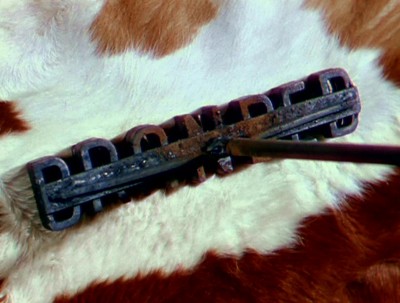
Weasel-eyed thief and killer T. Jefferson Leffingwell (Robert Keith) needs cold-blooded gunslinger Choya (Alan Ladd) to stay alive. Choya, holed-up in a general store with kindly hostage Dad Travis (Edward Clark), is the key to Leff's long dreamed-of scheme: tattoo an accomplice like Choya with a distinctive "birthmark," and pass that person off as the long-lost son of cattle baron, Richard Lavery (Charles Bickford). At the right age, and with no scruples, Choya fits the bill for Leff's plan, so Leff tracks the escaped Choya into the mountains, where he sells him on the deal. After a painful tattoo session from who else, Tattoo (John Berkes), and some pertinent background info from Leff on the Lavery family--including a crucial childhood memory of the lost Lavery boy that should prove Choya's ace when the chips are down--Choya is ready. Arriving at Lavery's Bar O ranch, sans Tattoo (who met an early demise at the hands of greedy Leff), Choya dismisses Leff and proceeds with the con, muscling his way into a job with foreman Ransome (Tom Tully), courtesy of pretty "sister" Ruth Lavery (Mona Freeman), who takes an instant interest in the handsome, churlish stranger. Provoking Richard Lavery as part of his plan, Choya allows Lavery to discover his birthmark, with the hook set in deep when Lavery and his wife (Selena Royle) are overjoyed at their boy's return. What Choya didn't count on was pangs of conscience at the sight of these two upstanding people buying his deception...or at the sight of his lovely "sister," Ruth.
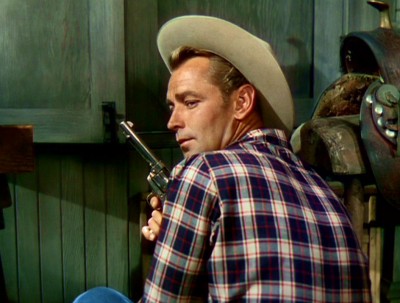
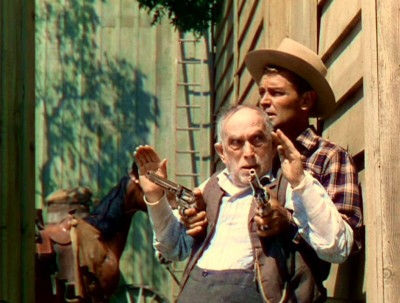
Watching a determinedly unpretentious, solidly-crafted oater like Branded drives home again how seductive the Western genre can be as a no-nonsense vehicle for a viewer's fantasies of ultimate violence, moral redemption, and perhaps the most quintessential expression of an American's notion of "freedom." If Western movies and television reached their peak of popularity in the nervous 1950s, when rapid, wholesale modernization (not just technologically-speaking, but also sociologically, politically, and culturally) was hell-bent on transforming almost every aspect of American life into the so-called "atomic age," imagine how a typical early 1950s American moviegoer, lined-up to enjoy Alan Ladd blowing away all his obstacles--a viewer still remarkably free of governmental oversight and crushing legal restrictions at that time--imagine how he or she would now pity the infinitely-oppressed, cowed modern moviegoer of today? If our fathers and grandfathers, tired of the "rat race" of their Man in the Gray Flannel Suit world, or weary of the union corruption of their On the Waterfront jobs, or sick to death of their Sitting Pretty "perfect" suburban home life (wives, especially), derived some sort of solace from watching Alan Ladd settle all his problems with his fists and six guns, would such big-screen big-saddle comfort be even possible today in our chilling, truly Orwellian world of NSA totalitarian omniscience, and the spiritual cradle-to-the-grave desiccation of ObozoCare?
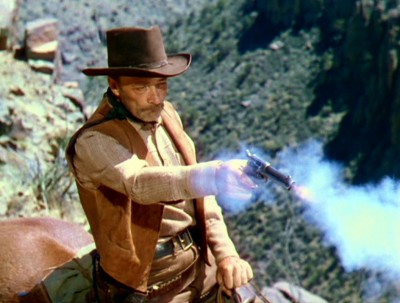
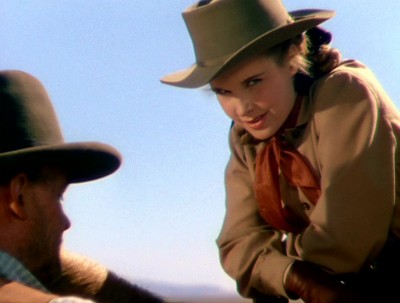
Probably not...but at least something like Branded is a distraction from this decay, serving as a quaint reminder of how a once-great people saw themselves. Based on Max Brand's Montana Rides (using his "Evan Evans" pen name), and scripted by pros Sydney Boehm (When Worlds Collide, The Big Heat, Violent Saturday, Shock Treatment) and Cyril Hume (Tarzan Escapes, The Great Gatsby, Forbidden Planet, Bigger than Life), Branded's leathery, straightforward approach is epitomized in the opening sequence: the branding of the title into a piece of cowhide, before the sight of men silently crawling out of windows and off roofs, waiting to get a shot at an unrepentant, cold-as-ice Ladd, holed-up in the town's general store. No pretext. No "Arizona, 1888" title card. No narrator. No theme song. No backstory on Ladd, or explanation of what he pulled to get into this situation. Story and character development through action is Branded's method, and it's a refreshing, bracing one (when characters do speak here, it's in an equally spare, yet ironic, cynical tone: when Freeman asks the cocky Ladd, "You kinda like yourself, don't you?" Ladd silkily drawls back, "It's the only affection I can depend on.").
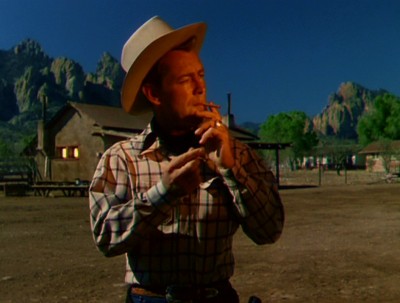
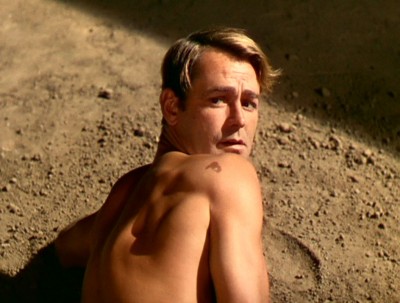
Beginning with a decidedly nasty tone, Branded's hard-heartedness is reflected in everything from the unforgiving Arizona landscapes to each character's outlook. Keith calmly blows away his partner off a mountain for his share of the loot, and thinks nothing of suggesting Ladd plug innocent Bickford as soon as their ruse is accepted. Bickford becomes incensed when one of his wild bronc's is busted by Ladd--Bickford only likes to bust the difficult ones. Even pretty, mild Freeman comes from gristle; she suggests Ladd be hired so foreman Tully can knock "uppity" Ladd down a peg. As for Ladd, he's an unrepentant rat bastard from the start, using kindly "Dad" Travis as a human shield for his initial escape, and later not batting an eye when Keith admits to killing his partner for the money. Naturally, this being 1950 and not one of Leone's or the subsequent Leone-influenced Hollywood Westerns of the 60s, we expect moral redemption for Ladd's anti-hero gunslinger, but it comes here subtly, in fits and starts, as the movie moves in unexpected ways toward a final message of surprising tolerance, SPOILER through the reuniting of the "real" Richard Lavery, Jr./Tonio (Peter Hansen) with his birth family--at the same time allowing for a relationship to continue with the man who actually raised him, Mexican bandit Joseph Calleia--and through the assimilation of loner Choya into the Lavery fold as a surrogate son/son-in-law, presumably, when he marries Ruth.
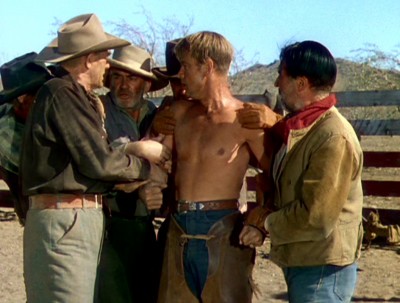
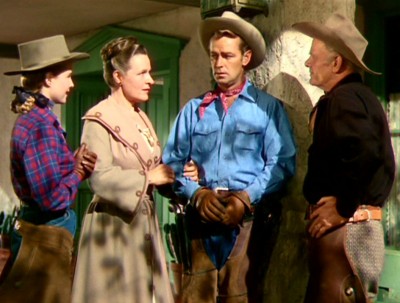
Too many reviewers are always "surprised" when they see a fine Alan Ladd performance, such as the one in Branded, as if they've heard the only good thing he ever did was for director George Stevens in Shane. On the contrary: not only was Ladd an adept, even sensitive performer (tough to do in the action genres he often found himself), he was also, to my mind, an iconographic figure that helped set into motion that modern gestalt of "cool" we now attribute to other, more readily-accessible forefathers. Certainly today when you try to run down the forerunners of the "cool" attitude as it's understood in pop culture today, guys like Steve McQueen and Robert Mitchum immediately come to mind, and of course their godfather, Bogie, to be sure. However, you never hear Ladd's name mentioned in the same league. Too bad, that, because his brand of frozen, inexpressive, sculpted blonde Angel of Death detachment (perfect for the early noirs he appeared in) plays as uniquely modern today, as does Bogie and McQueen. Portraying a character in Branded that could literally be Leone's "Man with No Name" (when asked what his real name is, or where he came from, or who his parents were, the cosmically isolated Choya--meaning "cactus"--truthfully answers, "I wouldn't know,"), Ladd's perfect features and weird mix of uber-calm and blank potential for violence, create an existential loner gunslinger that works first in the visual, before that deep, beautifully radio-trained baritone, devoid of emotion, glides out and seals the deal: this guy is death (that opening moment, where Ladd, expressionless, answers, "My guns," to Dad's query about Choya having any friends, is one of the most succinct, beautiful examples of post-modern nihilism I've ever seen in the movies. Period.). That Ladd persona of handsome, deadly nothingness, married to director Rudolph Mate's (D.O.A., The Violent Men, The 300 Spartans) driving story construction and clean, crisp, deeply-focused square frames (courtesy of wiz Charles Lang), is a puissant combination, elevating Branded's classical, epic-in-scope construct of disintegrated families, isolation, and revenge, into an elemental, primal--and entertaining as hell--oater.
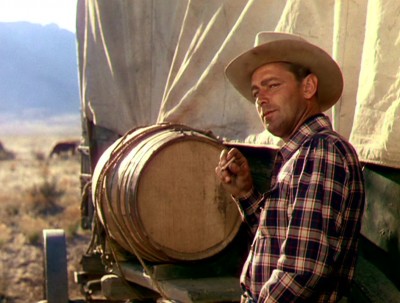
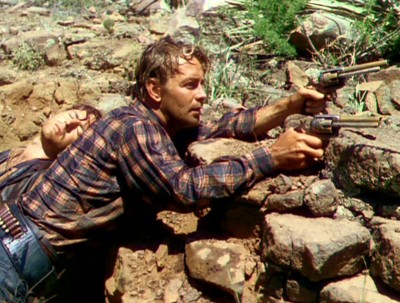
The DVD:
The Video:
I would imagine this is the same 1.37:1 transfer used in the 2005 Paramount disc release (since the Paramount logo is on there, not the WB's), but if it's not, the WB can let me know. As it stands, I can't say this is the best transfer of a Technicolor oater I've seen. Yes, there are few striking shots that look close to pristine...but most other scenes look a tad washed out, with registration problems here and there, as well as numerous color flashes. Not the greatest.
The Audio:
Lots of snaps in this Dolby Digital English mono audio track. English subtitles are included (another tip-off that his is the same transfer used back in 2005...since the Archive doesn't usually do subtitles).
The Extras:
No extras for Branded.
Final Thoughts:
Beautiful proto-nihilism...until 1950s conventions demand the family is brought together again. Alan Ladd's scary/handsome, ice-cold remorselessness is one of the seminal icons of American "cool;" combined here with director Rudolph Mate's invigorating "no bullsh*t" storytelling technique, that turn by Ladd puts Branded firmly in the category of "neglected gems" of 1950s Westerns. I'm highly, highly recommending Branded.
Paul Mavis is an internationally published movie and television historian, a member of the Online Film Critics Society, and the author of The Espionage Filmography.


|
| Popular Reviews |
| Sponsored Links |
|
|
| Sponsored Links |
|
|
| Release List | Reviews | Shop | Newsletter | Forum | DVD Giveaways | Blu-Ray | Advertise |
|
Copyright 2024 DVDTalk.com All Rights Reserved. Legal Info, Privacy Policy, Terms of Use,
Manage Preferences,
Your Privacy Choices | |||||||













